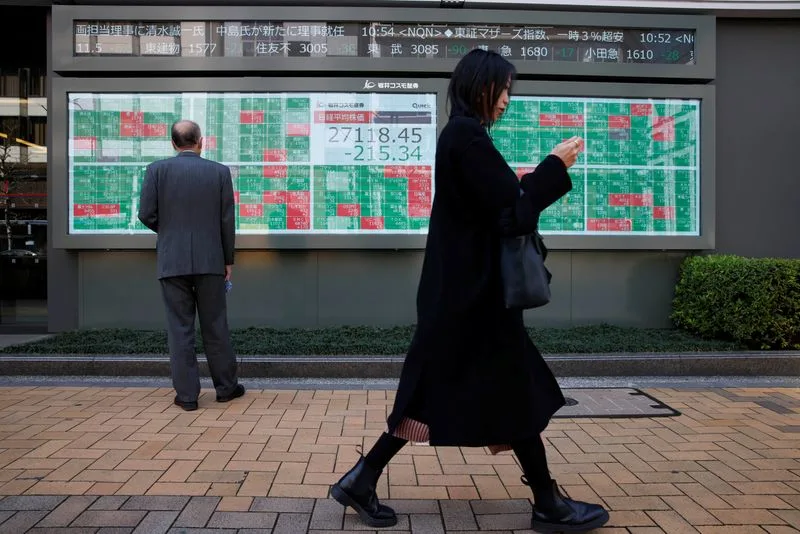
Treasury yields rose and the dollar index bounced off a one-year low on Friday after a decline in U.S. retail sales suggested the economy is slowing but not fast enough to stop the Federal Reserve from raising interest rates again in May.
Stocks on Wall Street fell and gold pulled back sharply after surging the day before to a more than one-year peak as markets struggle to determine when the Fed might pause its monetary tightening to curb high inflation.
Traders of futures tied to the Fed’s policy rate increased bets that the U.S. central bank will raise its lending rate next month by another quarter of a percentage point and pushed out to late this year a rate cut as typically occurs in a slowdown.
Consensus grows for Fed rate hike in May.
Retail sales fell more than expected in March as consumers cut back on purchases of motor vehicles and other big-ticket items, signs that the economy was slowing at the end of the first quarter because of higher interest rates.
Investors face a different set of circumstances than the past 30 years when after six months of rates peaking, the Fed would cut, said Dec Mullarkey, managing director of investment strategy & asset allocation at SLC Management in Boston.
“That playbook is a bit outdated,” he said. “The economy we have going is much stronger and much more different because of labor shortages than it has been in other typical cycles.”
Gold pulled back from near record highs as the dollar bounced and Fed Governor Christopher Waller added weight to the prospect of another rate hike, saying the central bank’s lack of progress on slowing inflation meant rates needed to move higher.
While the economic data suggests the U.S. economy is slowing and next month’s expected rate hike may be its last, how long rates stay at the highest since the onset of the global financial crisis in 2007 is unclear.
“The Fed is going to stay higher than it’s forecast. They’re going to hike one more time in May, then they’re going to go on pause,” said Brad Conger, deputy chief investment officer at Hirtle Callaghan & Co in West Conshohocken, Pennsylvania.
“Inflation is going to be stickier than people think.”
Futures priced in a 76.8% chance the Fed raises its lending rate to a range of 5.00%-5.25% when policymakers conclude a two-day meeting on May 3, up from 67% on Wednesday, CME Group’s FedWatch Tool showed.
The yield on two-year Treasuries, which move in step with interest rate expectations, jumped 11.6 basis points to 4.093%, while on 10-year notes they rose 6.2 basis points to 3.513%.
The dollar index rose 0.584%, with the euro down 0.43% to $1.0997.
GUIDANCE UNCERTAIN
Major U.S. stock indexes fell as financials limited losses in the S&P 500 after shares of JPMorgan Chase and other banks rallied following their quarterly results.
“The first quarter is going to be better than lowered expectations, which is good, but the guidance at best will be uncertain,” Conger said.
JPM Chief Executive Jamie Dimon said he expected the tumult from bank failures in March to pass, but “you still see sticky inflation and then in front of us issues like higher rates, the war in Ukraine — those are still substantial concerns.”
MSCI’s gauge of stocks across the globe shed 0.11%, while the Dow Jones Industrial Average fell 0.42%, the S&P 500 lost 0.21% and the Nasdaq Composite dropped 0.35%. But for the week, the three indexes rose.
In Europe, the broad STOXX 600 index rose for a fifth session in a row to hit its highest level since February 2022, advancing 0.58% on the day.
Asian shares gained after the Monetary Authority of Singapore (MAS) surprised many by leaving policy unchanged, saying the tightening already underway would ensure inflation slowed sharply later this year.
The euro was down 0.45% to $1.0998 after earlier hitting $1.10755, its highest in around a year.
European government bond yields rose for the week. The 10-year German bund’s yield rose to 2.433%, helping the benchmark post its biggest weekly rise since late September.
Oil prices rose after the West’s energy watchdog said it expected global demand to rise to a record high this year on the back of a recovery in Chinese consumption.
U.S. crude settled up 36 cents at $82.52 a barrel, while Brent rose 22 cents to settle at $86.31.
U.S. gold futures settled 1.9% lower at $2,015.80 an ounce.